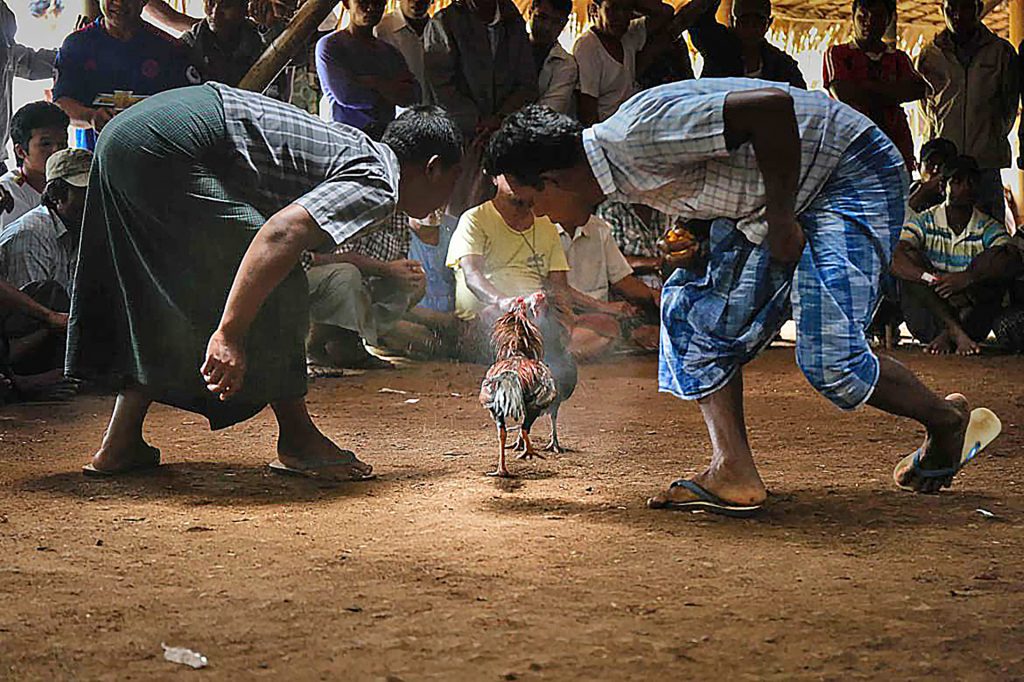Insight Email No. 22
This Insight Email is published on September 8, 2023, as a translation of the original Burmese language version that ISP-Myanmar sent out to the ISP Gabyin members on September 1, 2023.
This week’s ISP Insight Email No. 22 focuses on a series of concerning developments. One key setback since the military coup has been the proliferation of illicit gambling dens in Myanmar, which have ensnared many individuals in the debilitating cycle of betting. Our ISP-Myanmar socio-economic surveys have revealed some intriguing insights into this trend. Myanmar has also become an isolated ‘island-like’ state attracting the expansion of notorious transnational criminal syndicates which have long operated in the region. Their abuses are the subject of a popular new film. This bulletin also presents a brief account of India’s thrilling Moon mission. For the people of Myanmar though, the Moon itself is a far-flung dream, and worse, many people cannot even find comfort relaxing under the soothing glow of the moonlight.
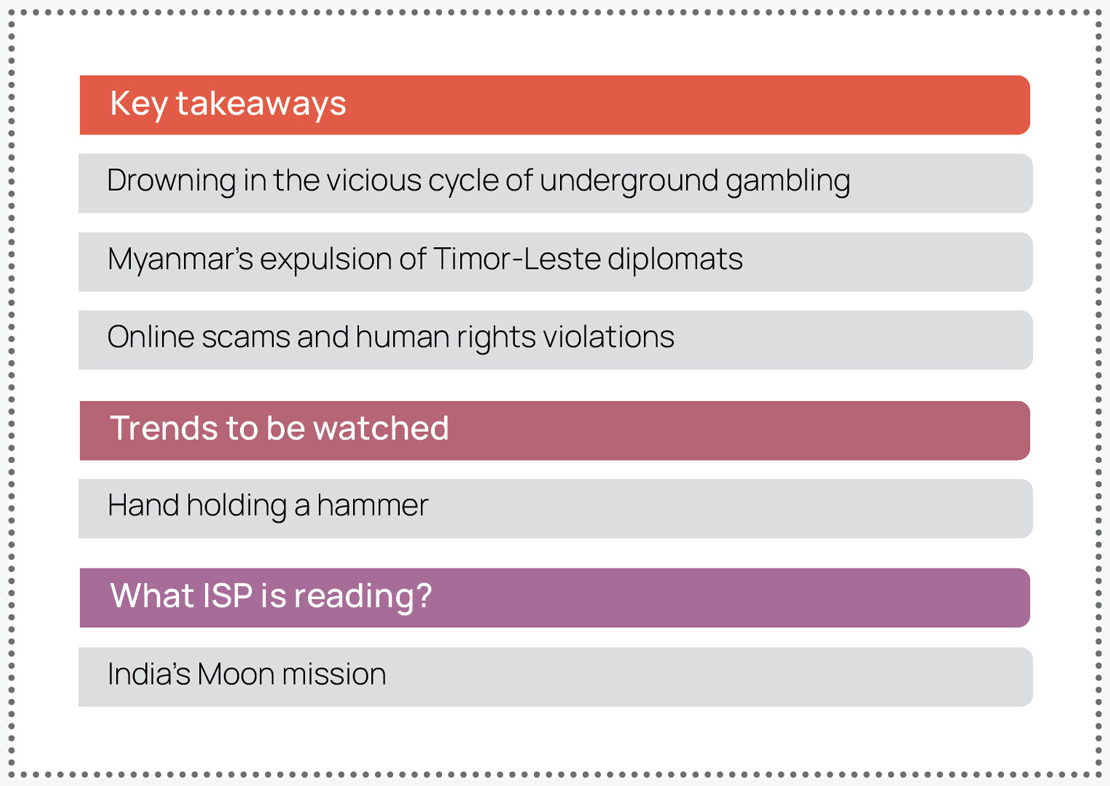
∎ Key takeaways
1.Drowning in the vicious cycle of gambling
According to a recent report, when the traditional earthen toy-pots festival was held in Mandalay, gambling dens were publicly authorized to operate. The festival grounds were secured by armed police and soldiers. People have reported increased sightings of gambling dens in open-air festivals and other public events since the coup. There are several reasons that ordinary people turn to gambling, as a quick fix to find easy money due to the difficult struggle of daily survival or because the unconducive environment for business and scarcity of jobs leave few alternatives.
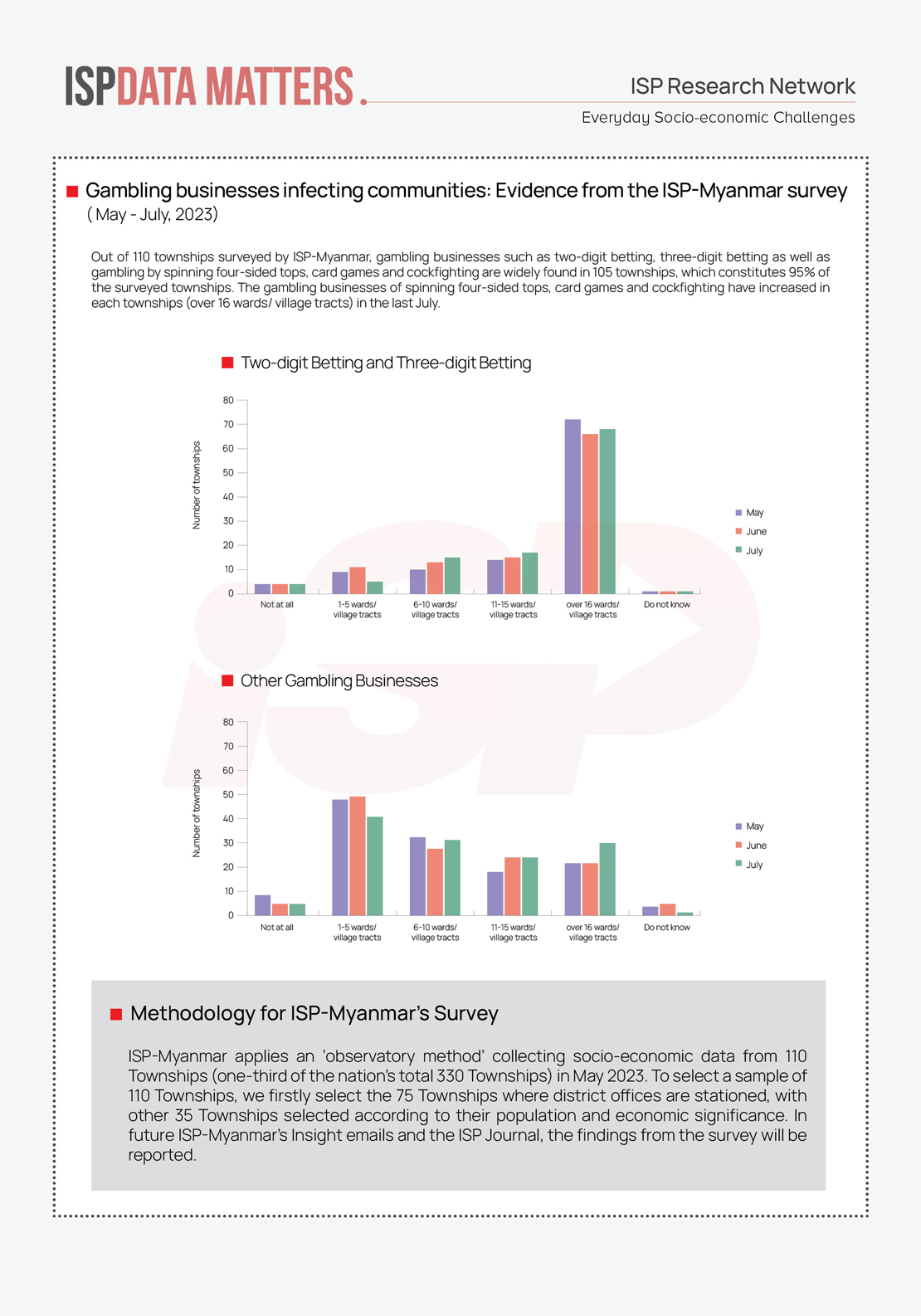
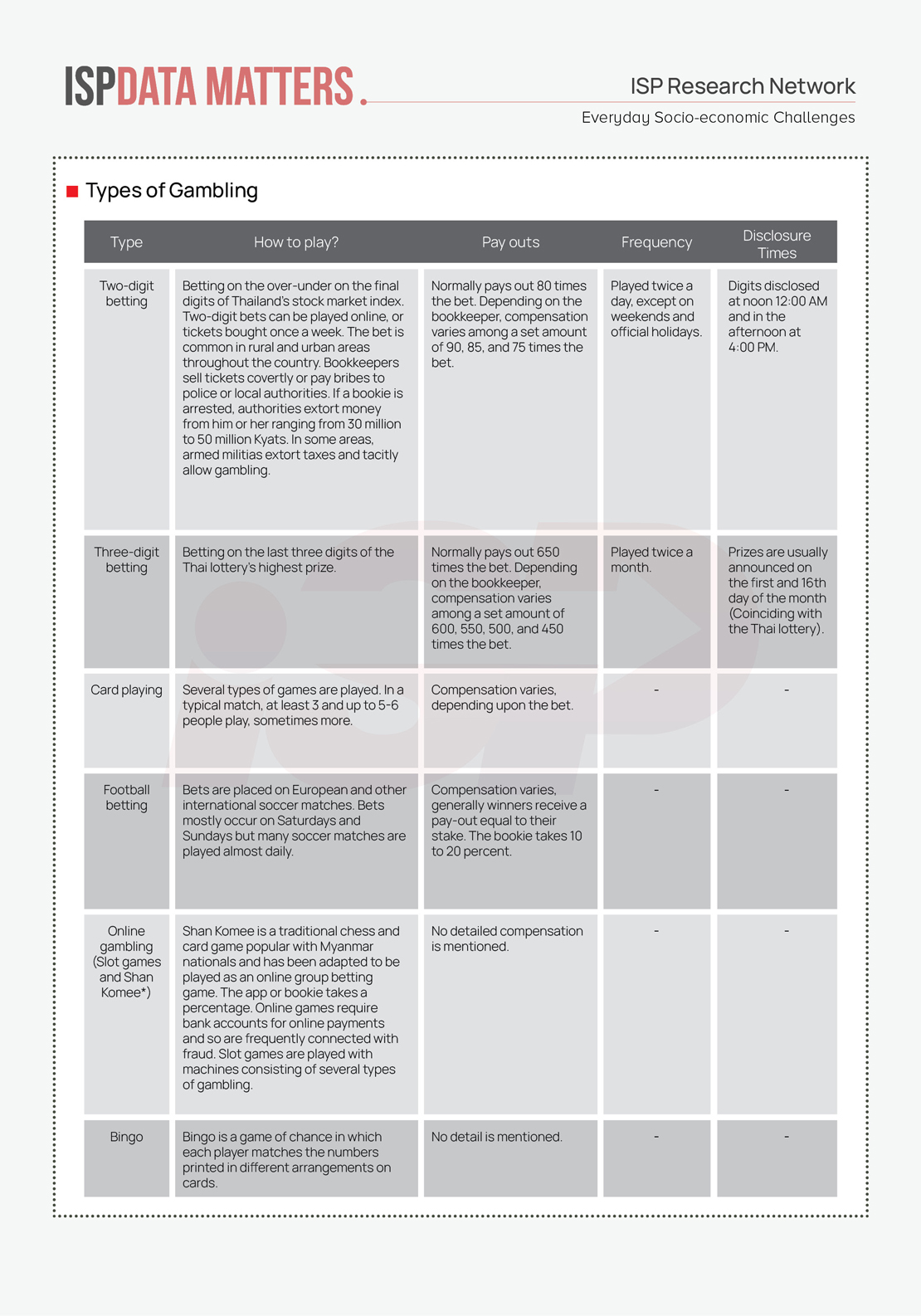
One key setback since the military coup has been the proliferation of illicit gambling dens in Myanmar, which have ensnared many individuals in the debilitating cycle of betting. This corresponds with ISP-Myanmar’s socio-economic survey in the country, which demonstrates that gambling activities have increased over the past three months. In 105 Townships, 95 percent of those 110 Townships surveyed, several kinds of gambling activities have been sighted, including two-digit betting, three-digit betting, commercial spinning top games, card playing, and cock-fighting. According to the survey, two-digit and three-digit betting is being played in 68 out of 110 Townships, each comprising of more than 16 wards or village tracts. 41 out of 110 Townships showed signs of not only two and three-digit betting but also demonstrated a growing prevalence of other additional gambling activities.
According to sources, many places in Myanmar organize ‘Our Day’ festivals specifically as a front in order to attract gambling operations. In addition the number of online gambling apps is growing, where one can bet on football matches, enter lotteries, and place many other types of bets. Many gambling games can be played on cell phones that conveniently use Burmese language. Despite the common saying, ‘people who bet on the two-three digits are destined to live in small huts,’ many people are increasingly interested in betting.
Two-digit betting is playing for the ‘over-under’ on Thailand’s stock market index numbers, based on the random final digits. Betting takes place twice a day. Three-digit betting is playing for the final three-digits of the Thai lottery. Betting takes place biweekly. Recently, a new form of digit betting has emerged, with people betting on the so-called Dubai lottery, six times a day. Many people have begun drowning in these and other forms of gambling, resulting in shattered lives, heavy indebtedness, and the disintegration of families. It is then a long way back to develop a healthy and strong society.
2.Myanmar’s expulsion of Timor-Leste diplomats
SAC’s Foreign Affairs Ministry sent a notification to the Timor-Leste representation office in Yangon ordering all diplomatic staff to leave the country by September 1. The primary reason for this action is seen as retaliation for the closer relationship that has developed between the Timor government and Myanmar’s opposition National Unity Government (NUG). This is the first public eviction of diplomats since the coup. In 2022 though the United Kingdom embassy’s chargé d’affaires ad interim, Mr. Pete Bowels was denied an entry visa to Myanmar. It is puzzling why the Myanmar junta would now begin openly practicing belligerent diplomacy and even more confusing how such action could be beneficial to its national interest.
With respect to Maynmar’s diplomacy in the new geopolitical situation, ISP-Myanmar organized the Myanmar Quartely Symposium in 2020. Dr. Thant Myint-U, a renowned historian noted that ‘we (Myanmar) are at the crossroads of Asia, but act like an island’ meaning that Myanmar has become a politically isolated state similar to a geographically isolated island.
Myanmar leaders are not allowed to attend ASEAN summits because of repercussions surrounding its failure to meaningfully implement the ASEAN five-point consensus (5PC). The ASEAN decided Myanmar to skip its alternate ASEAN Chairmanship in 2026. On the other hand, ASEAN is in a period of positive ascendency, ever more attractive to Foreign Direct Investment (FDI). Myanmar as it stands though is likely to remain lonely ‘like an island’. It is relevant to again quote Dr. Thant Myint-U’s recommendation at the 2020 Symposium.
‘There is absolutely no time to lose to develop Myanmar’s economy. We cannot lose another twenty years debating and fighting over internal differences. If Myanmar remains as poor as today, if Myanmar remains undeveloped as nations across the region become increasingly industrialized, the country can only be a pawn in the strategies of others.’

3.Online scams and human rights violations
Online scams have now grown from a criminal trend to become a global threat. Currently, hundreds of thousands of individuals are lured by the promise of high salaries and coerced into engaging in online fraud and illicit internet activities by organized criminal syndicates. Southeast Asia has become a hub for such criminal activities, which are particularly thriving in border areas and even in some cities in Myanmar, Laos, and Cambodia.
Post-coup Myanmar has now become a base camp for transnational criminal syndicates. They especially operate in border regions such as Shwe Kokku, the Wa and Kokant Autonomous Region, and in Mongla Special Region No. 4. Many Chinese nationals are frequently human trafficked to work in such a dirty industry. A recent blockbuster Chinese film, ‘No More Bets’ portrays this human trafficking and the serious violations and abuses that occur in the scam centers in which victims are forced to work. Such abuses have been occurring for quite a long time. According to data collected by ISP-Myanmar, at least 270 people were trafficked in 2022 while the number of victims increased to at least 500 in 2023 in Myanmar. This is a dramatic doubling within only a year.
In a recent report published by UN OHCHR, the trafficked victims from many countries are not only coerced to work in such fraudulant activities through threats, many have also been subjected to torture and cruel, inhuman, and degrading treatment or punishment, arbitrary detention, sexual violence, forced labor, and other human rights abuses. Victims of trafficking are not criminals, and they should be protected and given access to the rehabilitation and remedies they need, the UN report advocated.
Since the scam syndicates are threatening the safety of Chinese nationals and regional security, China’s government has more urgently and seriously pushed to crack down on them. In the last week of August, China’s Ministry of Public Security teamed up with Myanmar, Laos, and Thai officials to set up a coordination center in Chiang Mai to launch a special cooperative mechanism to crack down on human trafficking related to cyber scams.
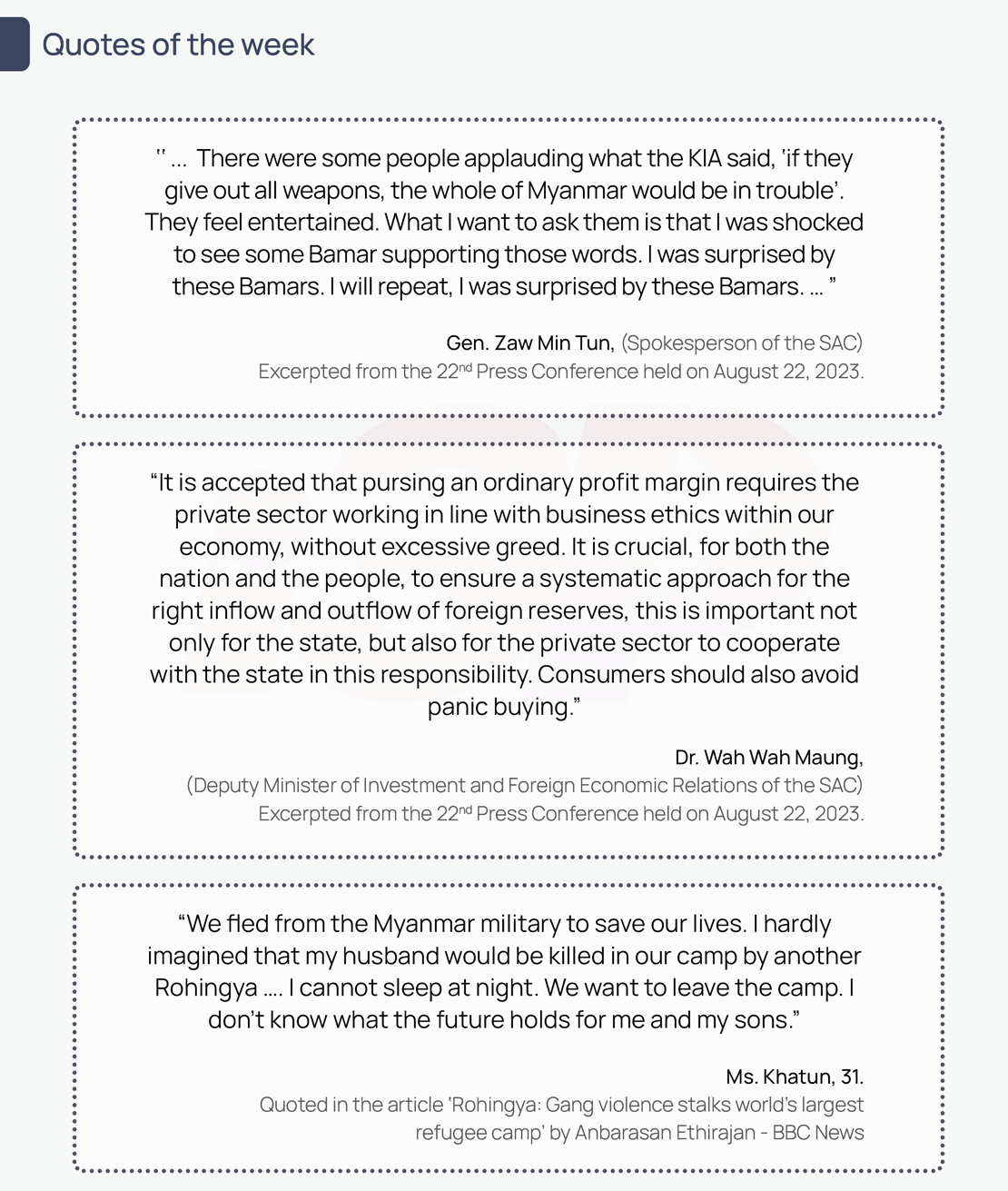
∎ Trends to be watched
Hand holding a hammer
Since the military coup in Myanmar, many analysts have anticipated the emergence of ad hoc policies and more restrictive controls on the economy. Much like their predecessors in the previous junta, the SAC appears to lack an understanding of the importance of incentives as well as lacking the capacity to create an environment conducive to running a functional economy. One of the factors influencing this approach may be the SAC’s desire to mitigate the adverse effects of external pressures, such as foreign sanctions and the evident xenophobia among SAC leaders. Consequently, the SAC has opted for a national economy strategy centered on self-sufficiency and import substitution.
The nature of a free market is that supply and demand keep production and consumption across the whole economy at equilibrium, a process characterized as being guided by the ‘invisible hand’ of the market. This equilibrated balancing act sets price levels and the quantities of the goods and services produced. Recently though, SAC leaders have been intervening in the economy with heavy-handed ‘visible hands.’ The military authorities have set up many committees to manage the economy, such as the Illegal Trade Eradication Steering Committee, the Foreign Exchange Supervisory Committee, the National Trade Facilitation Committee, the Gold, Forex Supervisory Committee, and the Supervisory Committee on Import, Storage and Distribution of Fuel Oil. These bodies are intended to reduce the power of intermediaries in trade, to reduce the price of fuel oil, to keep a watchful eye on speculative activities, and to prevent shortages of essential goods in the market.
A research report published by the Economic Research Hub on May 9, 2022 entitled ‘Myanmar’s Economic Governance after the Coup: Changes in Policy and Practice’, thoroughly discusses this environment which has developed due to the tendency towards ‘regime survival.’ Myanmar’s economy has been transformed from a rule-based and policy-based implementation system into a people-based one with a greater emphasis on using relationships between people in power in order to facilitate economic exchanges. Major systemic changes have been brought about in taxation, trade, the business environment, and in the finance and banking sectors. The most significant changes have occurred in the telecommunication and banking sectors. These changes have resulted in tremendous losses to society as a whole. While some may find themselves winners in the new system, the majority of the population loses out and the whole economy significantly underperforms. There is a saying “to someone whose only tool is a hammer, every problem looks like a nail.” This expression suggests that the need for control under authoritarianism is being applied to economic governance.
∎ What ISP is reading?
India’s Moon mission
In an exciting moment recently, India’s lunar expedition Chandrayaan-3 (‘Moon-craft’ in Sanskrit) successfully landed a lunar vehicle at the South pole of the Moon. These days many countries have been participating in a competitive ‘Moon Rush.’ Prior to India’s spacecraft launch, Russia’s Lunar 25 attempted and failed a similar mission. The United States’ NASA has planned for the first humans to explore the region near the lunar South Pole in 2025. In 2021, both China and Russia laid out roadmaps for a future Moon-based space station.
While Chandrayaan-3 remains in orbit around the moon, its lunar lander Vikram (‘valor’ in Sanskrit) successfully touched down on the Moon’s surface on August 23 at 6:04 PM India Standard Time (7:04 PM Myanmar Standard Time). The lander subsequently successfully deployed the lunar rover, Pragyan (‘wisdom’ in Sanskrit). This has been hailed as a victory for a Southern hemisphere country as India becomes the fourth country to land a vehicle on the Moon. India’s Prime Minister Narendra Modi exclaimed in pride ‘This moment is unforgettable. This moment is unprecedented. This moment is the victory cry of a developed India’ while he was attending a conference in South Africa. He claimed ‘this success belongs to all of humanity.’ Moreover, he praised the key role of women scientists in this lunar exploration mission. This is a moment of national pride for Indian citizens.
India’s Institute of Space Research Organization (ISRO) stands out for succeeding in this crowning achievement with such a limited budget. Earlier, India’s PM Modi praised India’s ability to launch low-budget space missions. He once said the cost of sending an Indian rocket to space was less than the money invested in making a Hollywood movie, Modi was referring to the Hollywood film ‘Gravity’ which was made at a cost of around USD 80 million. The budget for the Chandrayaan-3 was around USD 74 million, the same amount as India’s successful Mars Orbiter Mission on September 24, 2014.
India pioneered its first space mission with the Aryabhata satellite in 1975 (meaning ‘astronomer’ in Sanskrit). Throughout its 47-year history, the development of India’s ISRO and its leadership has proven interesting, and several books are available on the subject. ISRO’s modern successes should properly be attributed to its founding father, Vikram Sarabhai, as well as its successive leaders. When India tested its first rocket in 1963, it was brought with a bullock cart to the site, as documented in a video on ‘ISRO’s heroes.’ When India first tested a nuclear bomb in 1974, the West imposed sanctions consisting of cutting off all assistance to India except humanitarian aid and banning the export of certain defense materials and technologies. Given this limitation, India has had to develop its national space program using only local scientists, domestic technology, and with many parts of the spacecraft having to be produced by local industries.
Following the success of the latest lunar mission, India ISRO’s first solar mission is scheduled to be launched on September 2, named ‘Aditya L1’. ‘Aditya’ means the Sun in Sanskrit and the mission aims to unravel the secrets of the Sun from a halo orbit providing real-time observations.

